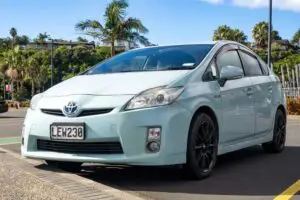The Toyota Prius, you might already be familiar with the name. It was introduced back in 1997 and has been a favorite to many.
The Toyota Prius is a subcompact vehicle with four doors. This sedan is worth looking at if you are looking to buy a luxury sedan.
The Toyota Prius is also one of the most produced petrol-electric hybrid vehicles in the market, which took the world by storm during its release.
If you are trying to find out how long do Toyota Prius last then the Prius has a lifespan rate of 200,000 miles to 250,000 miles guaranteed.
Some owner of the Toyota Prius has also reported their vehicle going above the 300,000 miles mark.
So with enough lookout towards the car, you can get a good amount of time out of this sedan.
If you are already hooked and interested in looking more into the Toyota Prius and all that it has to offer, then keep on reading below as I discuss all its parts, features, functions, cons, and pros.
Table of Contents
- 1 What Is The Average Life Expectancy Of A Toyota Prius?
- 2 Does Toyota Prius Last Longer Than Other Similar Vehicles?
- 3 Life Expectancy Of Toyota Prius Car Parts
- 4 What Is Good Mileage For A Used Toyota Prius?
- 5 How To Increase How Long Your Toyota Prius Last
- 6 Problems That Limit The Life Of Your Toyota Prius
- 7 What To Look For When Buying A Toyota Prius
- 8 Frequently Asked Questions
- 9 Conclusion
What Is The Average Life Expectancy Of A Toyota Prius?

Coming towards the life expectancy of the Toyota Prius, as I just mentioned above, the Prius has a life expectancy rate of 200,000 miles to 250,000 miles which is a standard amount of time for a sedan like the Prius.
If you say that the lifespan is less, I would agree. Still, as a counter-argument, if the vehicle is taken proper care of and maintained the way it should be, then you can easily increase the lifespan rate of the Prius.
Does Toyota Prius Last Longer Than Other Similar Vehicles?
You might be the most excited about this portion of the article, and it’s one of the most common concerns of any vehicle owner.
Let’s find out with a quick comparison if the Toyota Prius can last longer than its competitors or is it just below or just above them.
1. Toyota Prius Vs. Honda Insight
First up, I have a comparison between the Toyota Prius and Honda Insight.
It was first introduced in 1999 as a two-door vehicle and a second-generation 4 door vehicle. The Honda Insight also falls in the same category as the Prius.
Let’s find out which one is superior.
- The Toyota Prius has a lifespan rate of 200,000 miles to 250,000 miles. For a subcompact vehicle like the Prius, I would consider this lifespan rate pretty standard.
- Whereas the Honda Insight has a lifespan rate of 150,000 miles to 200,000 miles, the lifespan of any vehicle varies on the owner’s usage. Still, comparing the two rates here, this is an evident win for the Toyota Prius.
- The Toyota Prius has a mileage of 58 MPG in the city and 53 miles per gallon on the highway, an excellent mileage rate by the Prius, if I do say so myself.
- You can see the mileage rate difference between the two vehicles. However, the Honda Insight has a mileage rate of 55 MPG in the city and 49 miles per gallon on the highway. Comparing the two, I would say the Toyota Prius also gets this point.
- The overall rating of the Honda Insight is 78 out of 100 for reliability and 10 out of 10 for safety. A car can’t beat the safety rate unless it isn’t perfect,
- The overall rating of the Toyota Prius is 74 out of 100 for reliability and quality and 9.3 out of 10 for safety. I would give this last point to the Honda Insight because it has a perfect safety rating and a higher reliability score.
If the choice ever comes down to these two vehicles, I’d suggest going towards the Toyota Prius as its lifespan rate is higher and its mileage rate.
2. Toyota Prius Vs. Honda Civic
The next comparison I have is between the Toyota Prius and Honda Civic. The Civic was first introduced in 1972 as a two-door vehicle and later was modernized.
Let’s find out which one is better in terms of performance and mileage.
- The Toyota Prius, as we know, has a mileage rate of 58 MPG in the city and 53 MPG on the highway, 56 MPG combined, and as I previously mentioned, this mileage rate is pretty splendid for a sedan like the Prius.
- The Honda Civic has different mileage for different models, this sedan has a mileage rate of 31 MPG in the city and 40 MPG on the highway, and 35 MPG combined. The Toyota Prius has a higher mileage rate than the Civic; hence the first point goes to the Toyota Prius.
- The lifespan rate of the Toyota Prius as we know is 200,000 miles to 250,000 miles and can extend to a good 300,000 miles with proper maintenance whereas,
- The Honda Civic has a lifespan rate of 250,000 miles or 20 years of great performance and service. Comparing the two, both the vehicles have a similar lifespan rate, so that I would give both the sedans a point in this category.
- Lastly, the overall rating of the Toyota Prius is 74 out of 100 for reliability and quality of the car parts and has a 9.3 rating out of 10 for safety.
- The Honda Civic has 82 out of 100 for reliability and quality and a perfect score of 10 out of 10 for safety. In terms of victory in this category, I would go for the Civic.
Both the vehicles have a head-on-head rivalry, but if I were in the market looking to buy a sedan, I would go for the Toyota Prius as it has a good mileage for a subcompact vehicle.
Related: How Many Miles Will A Honda Civic Last?
3. Toyota Prius Vs. Toyota Corolla Axio Hybrid
Lastly, I have a comparison between the Toyota Prius and Toyota Corolla Axio Hybrid. A Toyota vs. Toyota was a must here.
Let’s find out if the Prius is superior to the Axio in terms of function, features, and mileage.
- The lifespan rate of the Toyota Axio Hybrid is 200,000 miles to 300,000 miles. For a sedan like the Axio, I would consider this lifespan rate to be standard enough to purchase because we know that,
- The lifespan rate of the Toyota Prius is 200,000 miles to 250,000 miles which are also very similar to that of the Toyota Axio Hybrid hence a point to both the sedans in this category.
- The mileage rate of the Toyota Prius is 58 MPG in the city and 53 MPG on the highway, and a combined total of 56 MPG altogether.
- The Toyota Axio Hybrid has a mileage of 28 MPG in the city and 34 MPG on the highway. As both the vehicles are Toyota produced, I would give this point to the Toyota Prius for having a higher mileage rate compared to the hybrid.
- The overall rating of the Toyota Axio Hybrid is 85 out of 100 for reliability and quality and 7.8 out of 10 for performance, and 7.9 out of 10 for safety. The rating of this sedan is standard, I would say.
- The Toyota Prius, as we know, has an overall rating of 74 out of 100 for reliability and quality and 9.3 out of 10 safety-wise. Comparing the two, I would give this point to both the vehicles. In each category, both the sedans balance out the percentage.
Both are Toyota-produced sedans, so I would personally prefer either one, but the Prius does seem to have a few advantages over the Axio Hybrid.
If you read the above points carefully, I’d say go for the Toyota Prius.
Life Expectancy Of Toyota Prius Car Parts
Below I will be discussing the life span you can expect from the Toyota Prius car parts. This is essential for your knowledge if you are serious about buying the Toyota Prius.
Further, I’ll mention how you can increase this lifespan rate to add more time to your Prius. So keep on reading below if you’re interested to find out more.
Average Lifespan Of Toyota Prius Brake Pads
Brake pads last 80,000 miles on hybrid vehicles, so comparing all these rates, the Prius brake pads last for an extraordinary amount of time.
The average lifespan of the Toyota Prius brake pads is 100,000 miles. Before this mile mark, the Prius does not need maintenance on its brake pads.
Furthermore, by driving sensibly, you can add more period to the life of the brake pads.
Average Lifespan Of Toyota Prius Battery
The average lifespan of the Toyota Prius battery is 100,000 miles to 150,000 miles which is approximately ten years, and ten years is a long time for a car battery to last.
You can try parking your vehicle inside in extreme weather conditions, especially the cold, to avoid unnecessary battery problems.
Average Lifespan Of Toyota Prius Tires
The average lifespan rate of the Toyota Prius tires is 50,000 miles to 60,000 miles which adds up to 2 to 4 years of life expectancy from the Prius tires, with a 12,000 to 15,000 miles usage per year.
The average Toyota tires also get a 50,000-mile lifespan rate, so the Prius tires last a standard amount of time.
You can increase the lifespan rate to 80,000 by driving on smooth roads, not going over the speed limit, and avoiding dribbling and sharp cuts.
Average Lifespan Of Toyota Prius Transmission
The average lifespan of the Toyota Prius transmission is 100,000 miles to 200,000 miles.
As this is very close to the actual lifespan rate of the Prius, I would say the transmission rate is pretty high for the sedan.
Moreover, after every 60,000 miles, the vehicle is covered, changed the fluids from the transmission are, and flushed properly.
This will add to the lifespan rate of the transmission, and who knows, you might get a few miles over the guaranteed rate.
Average Lifespan Of Toyota Prius Spark Plugs
The spark plugs life expectancy depends on the spark plug used. The average lifespan of the Toyota Prius spark plugs is 100,000 miles or more now.
The Iridium plugs, known to be the best quality, last up to 100,000 miles or more for the Prius, whereas platinum plugs can last 50,000 miles to 60,000 miles, and the lowest quality cooper plugs last around 20,000 miles on the Toyota Prius.
Average Lifespan Of Toyota Prius Key Fobs
The average lifespan of the Toyota Prius key fobs is three years, to say the minimum, and four years maximum.
The key fob is not what needs replacement. The little battery inside the key fob generates power for it to work.
This battery lasts 3 to 4 years. The key fobs are electrified versions but don’t worry. The company offers standard keys as well.
Hence in case of an emergency, you can easily enter your car to flee.
What Is Good Mileage For A Used Toyota Prius?

As the standard mileage for a Toyota Prius is 200,000 miles to 250,000 miles, if your main approach is to buy a used Prius, then the mileage rate of the used vehicle should be less. People suggest 100,000 miles or less.
Still, I would say opt towards a used vehicle that has 20,000 miles or less on it this way, you can easily enjoy all the features the Prius has to offer, and lesser mileage leads to the originality of the vehicle.
How To Increase How Long Your Toyota Prius Last
Here are some things you can do to increase the life span of the Toyota Prius.
All these factors are very easy to look after and, for your benefit, will add more time to your Toyota Prius, so if you’ve made it your goal to put a lease on the Prius, then do these things.
- Start your vehicle daily. This will play a vital role in the battery’s lifespan because the battery will freeze if left unused for a long time.
- Maintenance, regular check-ups by yourself, and monthly checkups by taking it down to the service shop.
- Solve an issue as soon as you see it. If you leave minor problems thinking its minor, they won’t stay little forever, and you will have bigger problems.
- When replacing any Toyota Prius car parts, use high-quality parts instead. This will also add lifespan to the Prius.
- The engine oil should be checked and changed in timely manner. Make sure to check the gear oil as well.
- Don’t park your car out in extreme weather conditions. Whether it’s too hot or too cold, the battery, tires, and overall exterior of the vehicle will be damaged.
These are some ways I could list to increase the lifespan rate of the Toyota Prius.
On the top of my head, you can read the manual that comes with the Prius for further knowledge on this topic.
Problems That Limit The Life Of Your Toyota Prius
Over the years, there have been several problems with the Toyota Prius that add judgment and lack of reliability to the vehicle.
Although these problems are annoying to deal with, most the vehicles face these problems as well, such as:
- Excessive oil consumption is expensive and not affordable for the lower class just trying to get the least out of their Toyota Prius.
- Especially the Prius models from 2010 to 2011 have reports of the insane amount of oil usage by the sedan. The repair cost is around $4000 on a higher average, which is crazy expensive to afford.
- Faulty headlights, the Toyota Prius has reports of having faulty headlights that turn off while driving, in the middle of the night especially. This is very dangerous and adds a decrease to the car’s safety functions.
- Sensitive windshield the Toyota Prius windshield is said to be sensitive and cracks easily. So if you are on the road at high speed freely driving the Prius, there are chances of the windshield cracking on you. I would consider this to be very dangerous as well.
- The fuel gauge does not accurately read the meter, so check the fuel before you go off for drives as the fuel count the meter shows could be at fault.
- Problems with the acceleration of the Toyota Prius are another very common problem, especially in the models from 2004 to 2009.
- This is usually because of gas pedals stuck in one place or wrong placing of the floor mats.
These are some of the most basic problems faced by Toyota Prius users.
Although Toyota has not taken proper measures to solve these issues just yet, you can tackle these issues with proper maintenance.
Related: Toyota Prius Starting Problems
What To Look For When Buying A Toyota Prius
You need to be aware of what the Toyota Prius offers and your need.
Whether you buy a used Toyota Prius or a brand new one, here are some factors you need to look into before buying the Prius.
- Warranty is definitely of the most important feature any car should have. Brand new cars do come with a warranty already, so this is a more concerning factor in used ones, so look into that before you lease the vehicle.
- Maintenance, usually, any vehicle comes with a manual where all the maintenance criteria are already mentioned thoroughly. Go through that, especially when buying a used vehicle.
- History of the vehicle, in case of any accidents, mishaps, or illegal factors concerning the car, you should be aware of it all.
- The mileage rate of the used car should be minimum. Opting for a pre-loved sedan, you should make sure the vehicle’s mileage rate is as low as possible.
- Check the brake pads and working of the brakes, especially if you’re buying a Prius model from 2016 or 2017. These models are said to fault the brakes, hence a factor to consider before buying.
These basic but important factors add more life to the vehicle if taken properly care of and will save you unwanted trouble after purchasing the car. It’s better to be safe than sorry.
Related: Best And Worst Years For Toyota Prius
Frequently Asked Questions
Q1. Is The Toyota Prius A Reliable Car?
Yes, the Toyota Prius is a reliable car. It has a reliability rate of 74 out of 100 as reviewed by the owners and users of the Prius.
Toyota vehicles are very reliable in terms of longevity and overall performance, so you can stay easy knowing the Prius will bow down to your reliability rate.
Q2. Does Toyota Prius Have A Lot Of Problems?
Yes, the Prius does have an alarming amount of problems that need to be looked into when buying a Prius, but I would say this in the Toyota Prius’ defense these problems are easily fixable such as:
- The Prius has excessive consumption of oil, which makes it a bit expensive.
- The headlights of the Prius are said to be faulty and turn off when you are on the road.
- The windshields are prone to crack at high speed or even when a small object hits them at any speed.
- Faulty brakes add a decrease to the safety factor of the Prius.
- A faulty fuel gauge shows the wrong reading of fuel capacity on the meter.
Some of these problems are easier to fix than others, but if you take proper maintenance measures, there is a chance you won’t have to face any of these issues.
Q3. Is It A Good Idea To Buy A Used Toyota Prius?
Yes, go for it if you are opting to buy a used Toyota Prius. The Prius is one of the easiest vehicles in the market to flip back at if you don’t like the sedan and get your cash back.
Used cars work great as long as the mileage rate of the vehicle is as least as possible. Further, look into the exterior and interior adjustment of the vehicle before buying a pre-loved Prius.
Q4. Does Toyota Prius Rust Easily?
It depends on the area you live in. Although Toyota vehicles are prone to rust sooner or later, a mark of 6 years is prescribed for the Prius.
Usually, the Prius starts rusting from the rear wheel, suspension components of the rear, the underbody of the Prius, and quarter panels.
Avoid parking your car on salty, icy, or watery roads.
Q5. Is Toyota Prius Expensive To Maintain?
No, the Toyota Prius is not expensive to maintain at all.
The Prius has an average yearly maintenance rate of $400, whereas other vehicles would require $1000 or more for annual repairing.
The Prius is not just cheap to maintain, but they are overall inexpensive to own as. Well, investing in a Prius will give you many advantages.
Conclusion
Finally with that last statement, I will conclude this article. The Toyota Prius is an amazing subcompact 4-door sedan to purchase for everyday use.
It has a lot of advantages over the other vehicles in the market as you can easily judge that by the comparison I did with the competitors of the Prius.
How long do Toyota Prius last?
How many issues will you face during your time owning the vehicle?
All that and much more are discussed in the article above, so if you are keen on buying a Prius, this article will find you good help.

I am Tahir Azam, and I have been writing amazing articles for TaxiHack for as long as I can remember. I know everything that is to know when it comes to automobiles and is always on top of industry news and developments. While I am not an expert by any means, I pride myself on knowing the ins and outs of many different problems and, of course, their solutions. The articles on our website are some of the best and well-researched content that you will find, and I spend countless hours making sure this remains to be true. This is why I ask you to take your time out and read some of my articles, especially if you find a topic that resonates with you or is something you are looking into. This way, you will find the perfect mix of information and tips on your desired topic. Learn more about Tahir.


